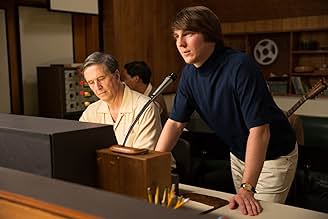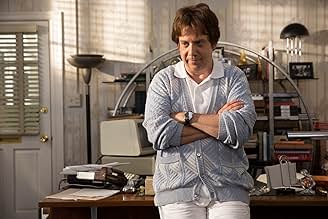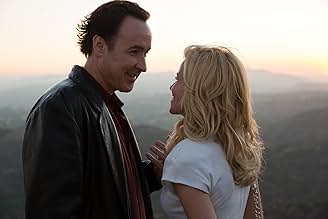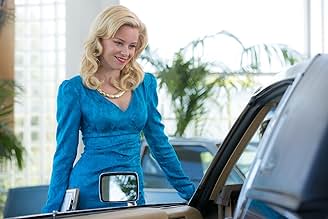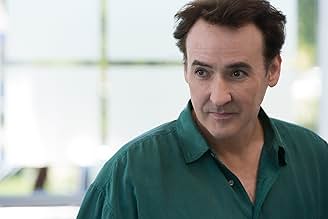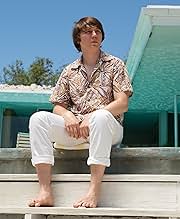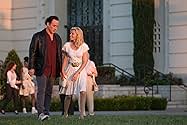Negli anni '60, il leader dei Beach Boys Brian Wilson lotta con la psicosi mentre tenta di realizzare il suo capolavoro pop.Negli anni '60, il leader dei Beach Boys Brian Wilson lotta con la psicosi mentre tenta di realizzare il suo capolavoro pop.Negli anni '60, il leader dei Beach Boys Brian Wilson lotta con la psicosi mentre tenta di realizzare il suo capolavoro pop.
- Regia
- Sceneggiatura
- Star
- Premi
- 20 vittorie e 58 candidature totali
Recensioni in evidenza
Brian Wilson's story is worthy of a movie. Neither his creative genius or his mental illness were appreciated until years after the fact. His childhood, as was Michael Jackson's 15 years later , shaped the adult life he inherited. His creative genius allowed and encouraged him to be used by others, including the other "Beach Boys". Mike Love is finally exposed in this film. The story is very interesting. The casting very good, the acting excellent. John Cusack hasn't been this good
maybe never. Elizabeth Banks will be a feature actor after this film. Dano did a very good job. Giamarti might have been a little over the top but to someone who appreciates the Beach Boys and music in general, the scenes from the recording studio are priceless. My fault finding with this movie are the direction and editing. Too long, too dry in spots. A better director would have won an Academy Award with this story
Anyone who knows me knows my favorite band is The Beach Boys, and my favorite musician is their leader, Brian Wilson. I first got deep into their music last November when I heard their album SMiLE, an album which wasn't officially released until 45 years after its conception and recording. It was worth the wait, as I consider it the best album I've ever heard.
I found out that a biopic of Wilson was in the works, and would be screening at SXSW with Wilson in attendance. I knew I had to go and see this film. The experience is one that will stick with me for the rest of my life as one of the most emotionally powerful events I have been a part of.
Love and Mercy is the story of The Beach Boys' founder Brian Wilson. The film chronicles his rise to fame in the 1960's and the his decline into mental illness, and his escape from the control of his therapist in the 1980's.
Paul Dano plays Wilson in the 1960's, and John Cusack plays him in the 1980's. It also stars Elizabeth Banks as Wilson's future wife, Melinda Ledbetter, and Paul Giamatti as his therapist, Eugene Landy.
Paul Dano exudes the boyish look of young Wilson perfectly. He relearned how to play piano for the role, and sings much of the music in the film.
His performance is hard to watch at times because of how depressing it is seeing him devolve from an energetic, fun young man into a tortured, drained artist. Dano handles the role with passion and care, and his performance never feels forced or fake.
When Wilson begins to suffer a panic attack, anyone who's had one will feel deeply for him. When he starts to have physical symptoms of depression after years of physical and mental abuse from his father and disapproval of his musical direction from fellow band mate Mike Love, Dano portrays the hurt that comes from those events with subtle facial expressions and natural transition.
John Cusack looks less like Wilson physically, but his performance may be even more complex. His Wilson has been to the bottom, and he brilliantly portrays how challenging it is to rebuild your life after going through mental and physical anguish.
Elizabeth Banks has a great departure from her more well known comedic film roles, and as Ledbetter, she shows her strength and respect for the man she loves through actions and subtle expressions instead of overt, over the top dialog.
Paul Giamatti has the most campy role in the film as Eugene Landy, but this is unfortunately how Landy was in real life. He was as violent and controlling over Wilson's life as the movie portrays, so his abusive, manipulative, angering performance is highly accurate.
One of the best things about Love and Mercy is that it doesn't exaggerate or make up events to make the film more interesting. The filmmakers trust the strength of its source material is interesting enough to make for a great story.
The storytelling structure of the movie is interesting and risky. The film jumps from the 60's to the 80's without warning, and it works. The slightly askew technique allows the audience to experience the downfall and uprising of Wilson's life simultaneously, and allows the movie to end on a happy note.
One complaint people have is that the film skips over the 1970's, Wilson's most tumultuous period in which he weighed 300 pounds and spent the majority of three years in bed, crippled by depression and drug addiction. However, this allows the audience to examine the reasons for his downfall and redemption instead of indulging in the horrible escapism Wilson turned to.
Beach Boys fans will appreciate the movie more than the average film-goer. Mike Love in hats, dancing, and mentioning "the formula"? Check. Drug tent and piano in the sandbox in Wilson's living room? Check. The infamous "Fire" session? Check. Everything is on point, from the scarily accurate wardrobe down to recreating the "Sloop John B." and "Surf's Up" promo videos shot for shot. It's these moments that show the film was made by fans with an attention for detail.
Almost every song on the album Pet Sounds is featured in the film somewhere. Seeing Wilson's unorthodox recording techniques is such a pleasure for music nerds.
Cinematographer Robert Yeoman, best known for creating the look of Wes Anderson's films, blends stylistic tone with realistic camera work, creating a sense of false nostalgia that is surreal yet inviting and intense.
Composer Atticus Ross works wonders with the score, using a great wealth of Wilson's music in different ways and choosing songs that fit with the emotional tone of the scene brilliantly. Hearing the instrumental version of "Don't Talk" play as Wilson takes LSD for the first time is haunting. Witnessing the song "Til' I Die" play over a surreal, Kubrickian scene in which Wilson has an epiphany made me cry because of the powerful combination of imagery and music.
The film is being released on June 5, to capitalize on The Beach Boys music being a staple of the summer, but it feels more like a Thanksgiving release to me. The cinematography, acting, script, and score are all Oscar worthy in my opinion, but the film may get lost in the race to other contenders, which is a shame.
Love and Mercy is an awesome, unorthodox biopic that takes risks with form and narrative that has strong performances, script, cinematography, and of course, an amazing soundtrack. It will expose young people to the brilliance of Wilson's music and give older fans an insight into why Wilson is the poster boy for using creativity as an escape and an outlet from the pain of life and mental illness.
And seriously, listen to the album SMiLE.
I found out that a biopic of Wilson was in the works, and would be screening at SXSW with Wilson in attendance. I knew I had to go and see this film. The experience is one that will stick with me for the rest of my life as one of the most emotionally powerful events I have been a part of.
Love and Mercy is the story of The Beach Boys' founder Brian Wilson. The film chronicles his rise to fame in the 1960's and the his decline into mental illness, and his escape from the control of his therapist in the 1980's.
Paul Dano plays Wilson in the 1960's, and John Cusack plays him in the 1980's. It also stars Elizabeth Banks as Wilson's future wife, Melinda Ledbetter, and Paul Giamatti as his therapist, Eugene Landy.
Paul Dano exudes the boyish look of young Wilson perfectly. He relearned how to play piano for the role, and sings much of the music in the film.
His performance is hard to watch at times because of how depressing it is seeing him devolve from an energetic, fun young man into a tortured, drained artist. Dano handles the role with passion and care, and his performance never feels forced or fake.
When Wilson begins to suffer a panic attack, anyone who's had one will feel deeply for him. When he starts to have physical symptoms of depression after years of physical and mental abuse from his father and disapproval of his musical direction from fellow band mate Mike Love, Dano portrays the hurt that comes from those events with subtle facial expressions and natural transition.
John Cusack looks less like Wilson physically, but his performance may be even more complex. His Wilson has been to the bottom, and he brilliantly portrays how challenging it is to rebuild your life after going through mental and physical anguish.
Elizabeth Banks has a great departure from her more well known comedic film roles, and as Ledbetter, she shows her strength and respect for the man she loves through actions and subtle expressions instead of overt, over the top dialog.
Paul Giamatti has the most campy role in the film as Eugene Landy, but this is unfortunately how Landy was in real life. He was as violent and controlling over Wilson's life as the movie portrays, so his abusive, manipulative, angering performance is highly accurate.
One of the best things about Love and Mercy is that it doesn't exaggerate or make up events to make the film more interesting. The filmmakers trust the strength of its source material is interesting enough to make for a great story.
The storytelling structure of the movie is interesting and risky. The film jumps from the 60's to the 80's without warning, and it works. The slightly askew technique allows the audience to experience the downfall and uprising of Wilson's life simultaneously, and allows the movie to end on a happy note.
One complaint people have is that the film skips over the 1970's, Wilson's most tumultuous period in which he weighed 300 pounds and spent the majority of three years in bed, crippled by depression and drug addiction. However, this allows the audience to examine the reasons for his downfall and redemption instead of indulging in the horrible escapism Wilson turned to.
Beach Boys fans will appreciate the movie more than the average film-goer. Mike Love in hats, dancing, and mentioning "the formula"? Check. Drug tent and piano in the sandbox in Wilson's living room? Check. The infamous "Fire" session? Check. Everything is on point, from the scarily accurate wardrobe down to recreating the "Sloop John B." and "Surf's Up" promo videos shot for shot. It's these moments that show the film was made by fans with an attention for detail.
Almost every song on the album Pet Sounds is featured in the film somewhere. Seeing Wilson's unorthodox recording techniques is such a pleasure for music nerds.
Cinematographer Robert Yeoman, best known for creating the look of Wes Anderson's films, blends stylistic tone with realistic camera work, creating a sense of false nostalgia that is surreal yet inviting and intense.
Composer Atticus Ross works wonders with the score, using a great wealth of Wilson's music in different ways and choosing songs that fit with the emotional tone of the scene brilliantly. Hearing the instrumental version of "Don't Talk" play as Wilson takes LSD for the first time is haunting. Witnessing the song "Til' I Die" play over a surreal, Kubrickian scene in which Wilson has an epiphany made me cry because of the powerful combination of imagery and music.
The film is being released on June 5, to capitalize on The Beach Boys music being a staple of the summer, but it feels more like a Thanksgiving release to me. The cinematography, acting, script, and score are all Oscar worthy in my opinion, but the film may get lost in the race to other contenders, which is a shame.
Love and Mercy is an awesome, unorthodox biopic that takes risks with form and narrative that has strong performances, script, cinematography, and of course, an amazing soundtrack. It will expose young people to the brilliance of Wilson's music and give older fans an insight into why Wilson is the poster boy for using creativity as an escape and an outlet from the pain of life and mental illness.
And seriously, listen to the album SMiLE.
10zadkine
I had no idea what this film was about. I thought it would be another musical biopic like "Walk the Line" or "Ray". It's nothing like those movies. This is the most intense, in-depth, and soulful look at the fragility of the creative mind since "All That Jazz". "All That Jazz" is the best film ever made about choreography and dance, this is the best film ever made about rock 'n roll. Dark, often depressing, but also exhilarating, "Love & Mercy", like "All That Jazz", captures the sense of loneliness and despair many creative geniuses suffer. And when the music starts, it's cool, loud, and breathtaking. "A Beautiful Mind" is the best film ever made about mental illness, because it's an unflinching and compassionate portrait rendered with remarkable artistic skill by director Ron Howard and acted by Russell Crowe. "Love & Mercy" is its equal: Director Bill Pohlad tells an equally moving story of a man's mind falling apart, every bit as skillfully as Ron Howard, and the performances by Paul Dano and John Cusack are each Oscar worthy - as was Russell Crowe's. And first and foremost, I found it to be one of the most painful and frightening portrayals of a tyrannical father ever put on film. Brian Wilson was surrounded by monsters, real and imaginary. In many ways the Beach Boys were a performing family, like the Osmonds or the Jackson 5, a band of brothers at the mercy of a brutal father. I could go on and on,there's a lot going on here - it's a terrific love story too - this movie delivers on so many levels.
This is the story of Brian Wilson during two time periods. In 1964, Brian Wilson (Paul Dano) has a panic attack and quits touring with the band. Instead he concentrates on writing for the new record Pet Sounds. He struggles from his abusive father and starts hearing voices. In the 80s, Brian (John Cusack) is under the control of his therapist Dr. Eugene Landy (Paul Giamatti). He buys a car from saleswoman Melinda Ledbetter (Elizabeth Banks) who eventually breaks Landy's hold on him.
This is a compelling biopic of an interesting person. Paul Dano really hits it out of the park. His section has some great scenes. On its own, John Cusack does a great job. Put together, I can't help but think that Cusack is doing a passable imitation of Dano's performance. I'm not judging their relative acting skills. I just think that Dano has always played this type of character and he simply fits better. I'm certain that Dano would be nominated for an Oscar if he played both time periods. Landy is the villain of the piece and Giamatti plays him with gusto. For a more nuanced character, the movie needs to show his character saving Brian at the beginning. Splitting the time period so neatly does lessen some important sections of Brian's life.
This is a compelling biopic of an interesting person. Paul Dano really hits it out of the park. His section has some great scenes. On its own, John Cusack does a great job. Put together, I can't help but think that Cusack is doing a passable imitation of Dano's performance. I'm not judging their relative acting skills. I just think that Dano has always played this type of character and he simply fits better. I'm certain that Dano would be nominated for an Oscar if he played both time periods. Landy is the villain of the piece and Giamatti plays him with gusto. For a more nuanced character, the movie needs to show his character saving Brian at the beginning. Splitting the time period so neatly does lessen some important sections of Brian's life.
Personal genius has been brilliantly portrayed in film before: "A Beautiful Mind" for maths; "Amadeus" for classical music; and more recently "A Theory of Everything" for cosmology. Behind such genius is often a degree of dysfunction, if not borderline madness.
Here with "Love and Mercy" we get an insight into the creative churning of Wilson's tortured mind. But it is very much a time-banded view, focused on two key periods of his life: 1966, with Paul Dano ("12 Years a Slave"; "Looper") playing Wilson, and the 1990's where Wilson – severely drug-damaged, mentally ill and now played by John Cusack - is being taken for a ride by an unscrupulous and dangerous psychiatrist, Dr Eugene Landy (Paul Giamatti). Playing a key role in his recovery is car saleswoman Melinda Ledbetter (Elizabeth Banks) who Wilson desperately latches onto as a drowning man might grab a life-vest.
Whilst the film could be described as a game of two halves, this is not how it is played out. We jump between both eras without warning, which works extremely well in maintaining the interest in the two parallel stories.
In biopic terms, the 60's segments are probably the more gripping, providing a riveting insight into the production techniques of the iconic "Pet Sounds" album, frequently cited as one of the most innovative and creative albums ever released. The film also features superbly recreated 'old footage' (cinematography by Robert D. Yeoman) showing Beach Boy TV slots and video productions. Wilson's genius is neatly reflected through the admiration of the session musicians: they'd "played with them all" – Sinatra, Presley, Sam Cooke, etc – but Wilson was something else entirely.
Paul Dano is just superb as the troubled youngster, physically and mentally abused by his father (an excellent Bill Camp) and exhibiting mental instability even before the dangers of LSD become evident. His slide into near insanity is brilliantly reflected in an audio soundscape that merges snatched Beach Boy fragments and natural sounds into a cacophony. If Edward Tize and his sound department doesn't get nominated for an Oscar for Best Sound Mixing there is no justice in the world.
In the 90's segments, Cusack delivers his best performance in years as the older Wilson. And after being rude about Elizabeth Banks' directing skills for "Pitch Perfect 2", I feel I have to express my admiration for her portrayal of perplexed astonishment as Melinda, a woman with a mission. Both extremely subtle and utterly enjoyable performances.
In contrast, the excellent Giamatti seems rather over the top as the scheming Landy, although internet articles suggest that it is a scarily accurate portrayal of the degree of control he exerted.
Directed by Bill Pohlad (someone normally found in the production office), it's difficult to fault such a lovingly crafted film. The pre-credits reference to a 'building scream' (I assume relating to the 'goose-bumpy' bit of "Good Vibrations") is never resolved. And (as I rather missed it in the film) the motives for Landy's extreme actions are a bit obscure (in reality, the Wilson family later discovered he was named as a 70% beneficiary in Wilson's will). However, this film, which deserved a broader and better-publicised release, stands as a superb tribute to an iconic musician and comes with a "highly recommended" from me.
(If you enjoyed this review, please see the illustrated version at bob-the-movie-man.com and enter your email address to receive future reviews. Thanks).
Here with "Love and Mercy" we get an insight into the creative churning of Wilson's tortured mind. But it is very much a time-banded view, focused on two key periods of his life: 1966, with Paul Dano ("12 Years a Slave"; "Looper") playing Wilson, and the 1990's where Wilson – severely drug-damaged, mentally ill and now played by John Cusack - is being taken for a ride by an unscrupulous and dangerous psychiatrist, Dr Eugene Landy (Paul Giamatti). Playing a key role in his recovery is car saleswoman Melinda Ledbetter (Elizabeth Banks) who Wilson desperately latches onto as a drowning man might grab a life-vest.
Whilst the film could be described as a game of two halves, this is not how it is played out. We jump between both eras without warning, which works extremely well in maintaining the interest in the two parallel stories.
In biopic terms, the 60's segments are probably the more gripping, providing a riveting insight into the production techniques of the iconic "Pet Sounds" album, frequently cited as one of the most innovative and creative albums ever released. The film also features superbly recreated 'old footage' (cinematography by Robert D. Yeoman) showing Beach Boy TV slots and video productions. Wilson's genius is neatly reflected through the admiration of the session musicians: they'd "played with them all" – Sinatra, Presley, Sam Cooke, etc – but Wilson was something else entirely.
Paul Dano is just superb as the troubled youngster, physically and mentally abused by his father (an excellent Bill Camp) and exhibiting mental instability even before the dangers of LSD become evident. His slide into near insanity is brilliantly reflected in an audio soundscape that merges snatched Beach Boy fragments and natural sounds into a cacophony. If Edward Tize and his sound department doesn't get nominated for an Oscar for Best Sound Mixing there is no justice in the world.
In the 90's segments, Cusack delivers his best performance in years as the older Wilson. And after being rude about Elizabeth Banks' directing skills for "Pitch Perfect 2", I feel I have to express my admiration for her portrayal of perplexed astonishment as Melinda, a woman with a mission. Both extremely subtle and utterly enjoyable performances.
In contrast, the excellent Giamatti seems rather over the top as the scheming Landy, although internet articles suggest that it is a scarily accurate portrayal of the degree of control he exerted.
Directed by Bill Pohlad (someone normally found in the production office), it's difficult to fault such a lovingly crafted film. The pre-credits reference to a 'building scream' (I assume relating to the 'goose-bumpy' bit of "Good Vibrations") is never resolved. And (as I rather missed it in the film) the motives for Landy's extreme actions are a bit obscure (in reality, the Wilson family later discovered he was named as a 70% beneficiary in Wilson's will). However, this film, which deserved a broader and better-publicised release, stands as a superb tribute to an iconic musician and comes with a "highly recommended" from me.
(If you enjoyed this review, please see the illustrated version at bob-the-movie-man.com and enter your email address to receive future reviews. Thanks).
Lo sapevi?
- QuizThe real Wilson reported having a mild dissociative experience while watching the film. He started to believe that Paul Giamatti was the actual Eugene Landy and felt "absolutely in fear" for several minutes.
- BlooperContrary to what is shown, the recording for "Good Vibrations" began during the making of "Pet Sounds", not after.
- Citazioni
Brian Future: I want you to leave, but I don't want you to leave me.
- Curiosità sui creditiFirst, there's concert footage of the recent Brian Wilson, himself, singing "Love & Mercy", and then at the very end there is audio of a brief recreated studio recording of Good Vibrations, with '60s Brian leading the dialogue.
- Versioni alternativeThe version which premiered at the 2014 Toronto Film Festival and a few subsequent public screenings contained a few extra scenes, such as an "I Get Around" studio sequence, and a scene where Wilson meets Phil Spector on the street. The closing song "One Kind of Love" was also absent from this cut.
- Colonne sonoreSurfin' U.S.A.
Written by Chuck Berry
Lyrics by Brian Wilson (uncredited)
Performed by The Beach Boys
Courtesy of Capitol Records
Under license from Universal Music Enterprises
I più visti
Accedi per valutare e creare un elenco di titoli salvati per ottenere consigli personalizzati
- How long is Love & Mercy?Powered by Alexa
Dettagli
- Data di uscita
- Paese di origine
- Siti ufficiali
- Lingua
- Celebre anche come
- Tutto per la musica - Brian Wilson & The Beach Boys
- Luoghi delle riprese
- Aziende produttrici
- Vedi altri crediti dell’azienda su IMDbPro
Botteghino
- Budget
- 10.000.000 USD (previsto)
- Lordo Stati Uniti e Canada
- 12.551.031 USD
- Fine settimana di apertura Stati Uniti e Canada
- 2.122.177 USD
- 7 giu 2015
- Lordo in tutto il mondo
- 28.641.776 USD
- Tempo di esecuzione2 ore 1 minuto
- Colore
- Mix di suoni
- Proporzioni
- 1.85 : 1
Contribuisci a questa pagina
Suggerisci una modifica o aggiungi i contenuti mancanti

Divario superiore
By what name was Love and Mercy (2014) officially released in India in English?
Rispondi






